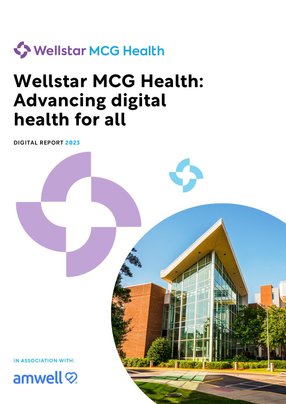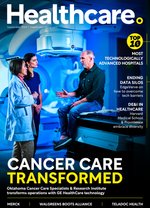Wellstar MCG Health is a world-class healthcare network, offering comprehensive primary, specialty and subspecialty care in Augusta, Georgia. The institution provides skilled, compassionate care to its patients while conducting leading-edge clinical research and fostering the medical education and training of tomorrow’s healthcare practitioners using digital means.
Doctor Matt Lyon, an Emergency Medicine physician for the Medical College of Georgia at Augusta University, has worked at the institution for a number of years and is currently implementing virtual care programmes, alongside Lauren Williams Hopkins, AVP Virtual Care and Community Engagement. The pair discusses the various programmes the institution offers, as well as how technology is revolutionising the healthcare system.
Augusta University Health’s Virtual Care and Care at Home Programs
Wellstar MCG Health has been performing telehealth for several years, with its journey beginning in 2003, with the tele-stroke programme, started by the current Dean of the Medical College of Georgia, Dr David Hess.
The foundation that the tele-stroke team formed paved the way for the institution to create a new service offering in addition to the tele-stroke programme focused on providing consultative care to rural emergency departments. In January 2020, Wellstar MCG Health launched its tele-ER to ER programme focused on providing consultative care to rural hospitals in their Emergency Department from WMCGH.
“However as COVID-19 evolved in Georgia, our newly formed programme evolved with it,” Hopkins says. “In July 2020, we added the inpatient consultative component to the programme so patients can be treated from triage and admission through discharge for rural hospitals in Georgia. This program enabled rural hospitals to keep and treat more complex patients during the COVID-19 pandemic. As COVID-19 began to slow in 2022 and 2023, the rural hospitals were able to still use their enhanced skills they focused on during the pandemic to treat more complex patients. This programme focuses on improving rural hospital’s transfer rates and financial viability by keeping patients in their rural community.” As of today, Wellstar MCG Health has sixteen hospitals in the rural virtual care network and are continuously growing to continue helping rural hospitals sustainability and health outcomes.
While this programme is now the largest component of services provided, Wellstar MCG Health also provides other acute care, ambulatory care, and direct-to-consumer virtual care programmes to patients and providers in Georgia. These range from tele-hospitalists, tele-paediatric ER, sickle cell, paediatric subspecialty care, reproductive medicine, primary care, and bariatric surgery. The institution is particularly focused on growing ambulatory care offerings to improve access and quality of care for all of Georgia to complement the acute care offerings in rural hospitals. This creates a more holistic care offering for patients in these communities by being able to access needed follow-up care without having to travel to an urban setting in Georgia.
Additionally, the Virtual Care @ Home programme was launched in February 2021 as a response to COVID-19. Like many others across the US and around the world, the hospital had limited beds and throughput was an issue. “When we launched the programme, it was focused on discharging patients home early from the hospital into their home-based setting where they were monitored by nurses 24/7 through remote monitoring kits and daily virtual visits with our Virtual Care Physicians and APPs from our tele-ER/CCU programme,” Hopkins said.
“This has evolved greatly since 2021 when additional resources, conditions, protocols and equipment have changed and progressed. The programme now provides daily in-person visits by a community paramedic for higher acuity patients who were discharged early or were not admitted at all to help avoid unnecessary admission. There is also a step-down virtual program for those patients who do not need in-person medical interventions but are still at risk for readmissions. The Virtual Care @ Home team actively monitors the patient through episodic remote monitoring devices and as needed virtual visits and in-person visits. This programme creates a continuity of care model that will provide patients more support as they transition from the inpatient setting to the community.”
As part of this at-home virtual programme, Community Paramedics and Registered Nurses travel to patients’ homes to provide the necessary care and support the organisation's Virtual Nursing and Provider teams. In 2022, the institution made the decision to apply for CMS’s Acute Care Hospital at Home to elevate the programme to provide acute care level services.
Wellstar MCG Health was the first hospital in Georgia to receive the waiver, in September 2022. The programme provides a continuity of care approach from acute care services to observation at home, post-admit management, enhanced monitoring at home and chronic disease monitoring at home. It has also tried to ensure patients can escalate and de-escalate within the construct of their homes by building a longitudinal care model to treat patients through virtual means.
“For Wellstar MCG Health, these programmes are a really important mechanism for addressing the disparities in healthcare across our state – particularly in rural populations,” Dr Lyon says. “Our Virtual Care at Home programme works closely with patients to provide the level of care they would expect in the hospital, just at home, instead.
“This is really important, because not only do patients benefit from being in their own homes – particularly as populations get older – but being in a normal, comfortable environment prevents complications and is also less costly for the healthcare system. So now, we’re able to apply the same resources, just with better care.”
Since 2021, Wellstar MCG Health has treated 1,086 patients with 6,538 days. The patients who were inpatients and were enrolled into the programme, had an overall Length of Stay (LOS) reduction of 1.56 generating direct cost savings to the institution of US$2.24mn (US$4K/patient). Having taken the approach of a longitudinal model, Wellstar MCG Health helps patients no matter what their needs are along the healthcare continuum.
Technology’s role in advancing digital health
After the pandemic, people began to see the power of technology and telemedicine, more so than ever before. Technology provides a way to keep better track of patients while gaining a deeper understanding of what's going on with their health and physiology. Wellstar MCG Health can, therefore, better tailor its treatments to patients – not only preventing side effects from medicines and therapies but also providing the best care possible.
“More advanced technology provides us with a better platform to keep in touch with our patients,” Dr Lyon adds. “Being able to communicate with our patients more and at the right time and the right place, has had a great impact on the patient's care. I see technology as a tool to improve how we interact with our patients.”
What’s more, Wellstar MCG Health uses digital health as a growth strategy, by reaching populations that are typically out of the hospital's catchment area. By connecting people digitally, Wellstar MCG Health is able to reach new and different populations, and is consequently able to increase health equity and decrease disparities within the healthcare system across the state.
“Digital health is a new way of delivering healthcare,” Dr Lyon says. “Many people were not trained in how to use telemedicine and telehealth to take care of people outside the physical walls of a hospital or a clinic. We, therefore, used tele-education, which is really based on telemedicine and telehealth, to help leaders understand the power of these technologies but also to help shape the culture of our providers, Nurses, Respiratory Therapists and Clinicians, to help their perception of how we can utilise our time and talents to reach winder populations and new people.”
Additionally, digital health has enabled the hospital to have a greater social impact, by connecting more people to these healthcare resources. Dr Lyon explains: “The better you keep your population's health, the better you keep the individual person's health and the more likely they will be able to contribute to the workforce and to the other aspects of society. So our goal is to utilise technology and to ensure we’re using digital health to reach as many people as possible, equally.”
Wellstar MCG Health’s partnership with AmWell
Wellstar MCG Health and AmWell have had a relationship since August 2019, when Wellstar MCG Health contracted with AmWell – American Well at the time – to support their direct-to-consumer (D2C) strategy by deploying a virtual urgent care platform.
The partnership proved to be perfect timing as implementation was set for March 2020. Wellstar MCG Health worked together with AmWell’s leadership team on the roll-out of the D2C platform to assist our organisation in response to the COVID-19 pandemic. Additionally, the hospital launched a state-wide virtual screening platform through AmWell’s Home Application that supports Wellstar MCG Health in seeing over 25K Georgians from March 13, 2020, through June 13, 2020. This platform improved patients’ access to timely testing, screening for appropriate testing, and assisted patients in ensuring they got the appropriate level of care needed to treat the virus.
“Wellstar MCG Health transitioned the COVID-19 Virtual Screening platform to a virtual urgent care platform to assist the organisation with throughput and ER access concerns,” Dr Lyon says. “Wellstar MCG Health also utilised AmWell’s D2C tools to provide scheduled virtual visits through all its ambulatory based practices starting in 2020. These tools are still utilised by our ambulatory practice sites.”
Along with the D2C offering, Wellstar MCG Health leverages other solutions from AmWell, including their hospital-based platform to execute provider to provider telehealth clinics. This platform is leveraged for several specialties including transplant, school-based clinics, cardiology, and sickle cell.
What’s more, Wellstar MCG Health also leverages AmWell telehealth cart fleet when launching provider to provider sites across the state of Georgia. These carts are utilised in 16 locations across the state in the rural virtual care network in which Wellstar MCG Health provides tele-ER and Critical Care consultative services to rural hospitals, school systems in which the organisation provides school-based behavioural health and primary care services. Additionally, they provide tele-hospitalist services to Warm Springs Rehabilitation Hospital for their long-term acute care facility and inpatient rehab facility, and multiple specialty-based clinics in Georgia.
“The partnership with AmWell has strengthened Wellstar MCG Health to be a leader in the market for telehealth offerings,” Dr Lyon concludes. “We value the relationship with AmWell as they are very open to suggestions and feedback, and work to ensure our strategies align not only to achieve Wellstar MCG Health’s goals, but focusing on ways to improve overall health outcome and improving patient and provider satisfaction.”


